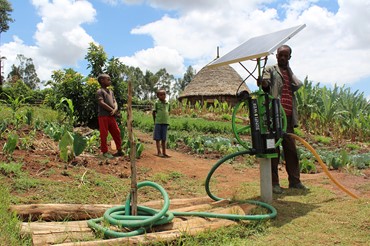The impacts brought on by climate change are affecting water resources all over the world. Today, approximately 1.1 billion people worldwide lack access to safe water and live with the resulting negative impacts. Many of the most severe consequences can be felt in Egypt. With an annual growth of 2 million people, combined with climate change effects and upstream water management measures, Egypt will become a country of absolute water scarcity very soon, where there will be less than 500 cubic metres of water per person available per year. Water scarcity poses severe challenges to water managers to maintain food and water security within the broader goal of sustainable development.
In an effort to address these issues within the context of water sector reform, the Government of Egypt and the EU launched the EU Water Sector Technical Assistance and Reforms Support (EU Water STARS) project in 2018. It was implemented by Egypt's Ministry of Water Resources & Irrigation (MWRI). The NIRAS-led consortium was contracted to provide technical assistance towards institutional, legislative and managerial reform in the water sector by improving the operational efficiencies of concerned stakeholders and beneficiaries. The project team's role was to enhance financial sustainability in the water sector, introduce new tools like water accounting, prepare technical studies, and develop communication and information plans for public awareness in resources conservation.
Large and complex with lots of moving parts
At the end of January, a closing ceremony brought together experts, stakeholders, and beneficiaries in Cairo to hear about project key deliverables. Team Leader and long-time NIRAS collaborator Philip Riddell laid out the overall scope of the project team's holistic approach: "Our approach has been inclusive because it has been targeted at the population as a whole […]. We've included as many members of the Ministry staff as possible. The approach has been consultative. Where we've needed to learn from our peers in the country, we have made every effort to consult with them. Our approach has been analytical […]. We've done financial, hydraulic, economic, and financing analyses. Our approach has also been creative. We've developed new tools for water accounting and assessing financing options […]. We've come up with some imaginative mapping for concepts and items that are not normally mapped, particularly economic externalities […]. And our approach has been comprehensive […]. We've gone considerably beyond the terms of reference at the request of either the Ministry or the contracting authority."
Spanning four years, the scale and complexity of the project relied heavily on healthy and robust collaborative relations between the myriad of involved parties. And despite hitting a few bumps, primarily due to the COVID situation, the project had a smooth run and generated an impressive number of deliverables. Local experts' participation and hard work were vital in reaching the goals and targets set out in the terms of reference. Speaking at the ceremony, Ms Juana Mera Cabello, Head of Economic Cooperation at the EU Delegation in Egypt, expressed how pleased both the EU Delegation and the MWRI are with the project: “Water STARS is a project that is very close to our hearts. In the last years we have witnessed how water has attracted more attention from local and international stakeholders. Cooperation in the water sector is one of the top priorities of the European Union, and STARS is considered a flagship project”.
Ms Cabello also highlighted the sustainability and longevity of the project, which has trained more than 5000 individuals who will go on to share their knowledge, and introduced innovative elements, such as a water accounting tool and the Nile forecast system. “All in all it has been a very successful project,” she concluded.





